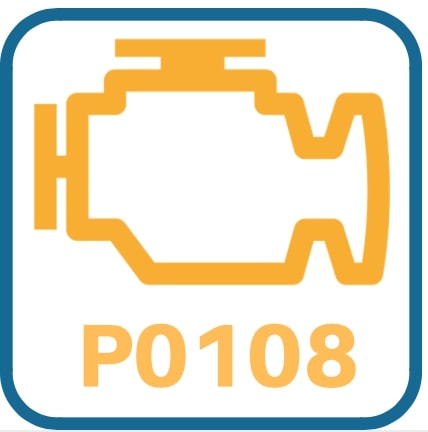P0108 is a generic OBD-II trouble code. It indicates your Mercury Villager’s MAP (manifold absolute pressure) sensor’s voltage reading is outside of the normal operating range. The voltage is too high. It’s most commonly caused by a bad MAP sensor, wiring issue, or vacuum leak.
The MAP sensor measures the air pressure coming into your Villager’s engine and sends that signal to the ECM. It does this by sending a voltage ranging from 1 to 5 volts. 1 volt would be idle speed. The signal should be at 5 volts whenever the vehicle is at wide open throttle. P0108 is triggered whenever the signal from this wire is MORE THAN 5 volts, which shouldn’t happen.
P0108 can also trigger if the ECM thinks the voltage coming from the MAP sensor is higher than it should be at any given time.
P0108 Quick Facts
- P0108 is caused when there’s too much voltage coming from the MAP sensor to the ECM.
- Most commonly caused by a bad MAP sensor. Vacuum or wiring issue are the next most common causes.
- Usually results in a rough running vehicle.
- A voltage meter is required to diagnose the MAP sensor.
P0108 Symptoms: Mercury Villager
P0108 is always going to do more than just trigger the check engine light. The MAP sensor is vital to a well running vehicle. If it’s gone bad, it’ll really affect drivability.
Here are the most common symptoms of P0108:
- Poor Gas Mileage
- Rough Running/Stalling Engine
- Motor Won’t Start at All
- Black Exhaust Smoke
- Check Engine Light
Mercury Villager P0108 Causes + Diagnosis
When diagnosing this code, if your Villager is running fine you should first reset the code and take the vehicle out and try to reproduce the problem. It may have just been a one time thing.
Map Sensor
The first thing that you should do is test the MAP sensor itself. A good voltmeter is necessary for this step. You can get them pretty cheap from any hardware store or Amazon. The reading from the voltmeter should be around 1 to 1.5 volts at idle. If it’s higher, you may need a new MAP sensor.
Here’s a pretty good YouTube video that shows exactly how you would go about testing the sensor:
Vacuum Leak
A vacuum leak is a very common reason that P0108 is triggered. If there isn’t enough vacuum going to the MAP sensor it’ll give a higher voltage reading than the operating conditions suggest should be there.
The vacuum supply to the MAP sensor could have a leak, or there could be a vacuum leak around the engine as a whole. Check all the vacuum lines on the engine. Check to see if any of them appear to be brittle, melted or cracked. If they are, replace them and see if that solves the problem.
Another place that vacuum can leak from the intake manifold. Here’s a solid article from Popular Mechanics on how to track down a vacuum leak.
Wiring Issues
The easiest thing that you can do when P0108 is triggered is check your Villager’s wiring harness. Is it plugged in to the MAP Sensor tightly? Does it have any visible signs of damage? Follow it as far as you can and make sure. It’s going to have a ground wire. Make sure that ground is plugged in tightly. Here’s a good video on how to find a short in a vehicle.
Other
While the three causes listed above are the most common reasons P0108 shows up, there are other reasons as well. If your Villager’s motor is worn out and isn’t producing a good vacuum anymore, that’ll cause the MAP sensor to output a higher voltage at all times and throw the code.
It’s also possible that an engine that is misfiring or has low fuel pressure can trigger this code as well. It would need to be a pretty noticeable misfire. You should also get P0300 or P030X (X representing the cylinder number of the misfire) with P0108 if misfiring was the case.
Conclusion: P0108 Villager
While it is most likely to be the MAP sensor itself that is causing P0108 in your Mercury Villager, properly identifying the problem can save you from purchasing and installing a sensor that you don’t need If there is anything that you would like to add, please leave a comment below. Good luck!


